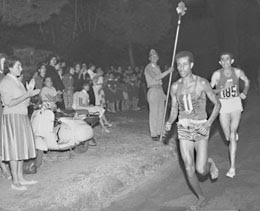abebe bikila

Abebe Bikila.
Quite a few of the other runners may have sniggered when they saw Abebe Bikila turn up at the start of the 1960 Olympic marathon with no shoes. But they only saw his back. Two hours and fifteen minutes later Abebe Bikila was the Olympic champion in Rome.
Born on August 7 in 1932 at Jato, a small village outside the town Mendida (north of Addis Ababa) in Ethopia on the day of the Los Angeles Olympic marathon, as son of a shepherd. He died only forty one years old as a crippled and very sick man. A stadium in Addis Ababa is now named after him but he will always remembered, all over the world, for his race in Rome.
Bikila was only added to the Ethiopian team for the Rome Olympics at the very last moment (some say “ as the plane to Rome was about to leave”) as a replacement for Wami Biratu (who had broken his ankle in a soccer match). It was major Onni Niskanen a Finnish born Swede who, hired by the Ethiopian government to train the runners, entered Bikila and Mamo Wolde in the marathon.
The race had a start and finish at the same place; the Arch of Constantine, just outside the Colosseum.
The late afternoon race and finished in the early night when it was already dark. The competition began in the evening in order to avoid the summer heat. It was one of those nights. Ethiopian Abebe Bikila was an unforgettable sight running along the ancient Appian Way.
The Appian Way (Italian: Via Appia) was one of the earliest and strategically most important roads in Romen during the ancient republic. Connecting Rome to Brindisi. The road is named after Appius Claudius Caecus, the Roman censor who started it as a military road to the south in 312 BC .
At the end it came down to just two runners in the final miles, the unheralded Bikila and Moroccan Rhadi Ben Adbesselem.
Adidas, the shoe sponsor at the 1960 Summer Olympics, had few shoes left when Bikila went to try out shoes and he ended up with a pair that didn’t fit comfortably, so he couldn't use them. A couple of hours before the race, Abebe decided to run barefoot, the way he'd trained for the race. Bikila was warned by Niskanen about his main rivals, one of whom was Rhadi Ben Abdesselam from Morocco, who was supposed to wear number 26. For unknown reasons, Rhadi did not acquire his black marathon bib before the race, and instead was wearing his regularly assigned track and field bib number 185.
During the race Bikila had passed numerous runners, looking for the runner with number 26. By about 20 km, Bikila and the runner with number 185 had created a gap from the rest of the pack. Bikila kept looking forward to find the runner with number 26, who unbeknownst to Bikila was running right beside him. They stayed together until the last 500 m. The skinny Bikila, flew by the soldiers standing with flaming torches along the darkening course that evening and slowly pulled away from his Moroccan opponent before crossing the finish line at the Arch of Constantine in a world-record time of 2:15:16. With his 26-second win over Rhadi. Niskanen later speculated that if Rhadi hadn’t competed in the 10,000 m race several days before, the race might have been close
Bikila the first black African to win an Olympic gold medal.
Asked later why he ran barefoot, Bikila replied, "I wanted the world to know that my country, Ethiopia, has always won with determination and heroism."
Fittingly, his win came in Italy, the nation that invaded his homeland three decades earlier. Bikila would battle back from an appendectomy to repeat as Olympic marathon champion four years later in Tokyo, becoming the first ever to successfully defend a marathon gold medal. But it was on the streets of Rome that Bikila left his mark.
Afterthought:
In 1972, Bikila was invited to the Munich Olympic Games as a special guest. Sitting in his wheelchair(from 1969 he was paralyzed waist down after a car accident), he watched American Frank Shorter win the marathon. Shorter received his medal, then went to Bikila to shake his hand.
In 1973, Bikila died from a brain hemorrhage. He was 41 years old and left a wife and four children. His career included fifteen marathon races, with twelve victories. After his death, Haile Selassie proclaimed a national day of mourning; 65,000 people attended the funeral.
Please, read more in the sources below.
I just did a copy/paste/write this story using information from these:
http://en.wikipedia.org/wiki/Abebe_Bikila.
Memorable Olympic Moments: Abebe Bikila, Rome 1960 — Infoplease.com http://www.infoplease.com/spot/summer-olympics-abebe-bikila.html#ixzz136FBsQVv.
http://www.time.com/time/magazine/article/0,9171,1829863,00.html
http://www.tadias.com/03/21/2010/gena-wins-rome-marathon-barefoot-pays-homage-to-abebe-bikila/
http://en.wikipedia.org/wiki/Appian_Way.
http://www.answers.com/topic/abebe-bikila.
http://sportgeschiedenis.nl/2010/10/22/abebe-bikila-na-50-jaar-herdacht.aspx


Comments